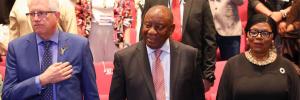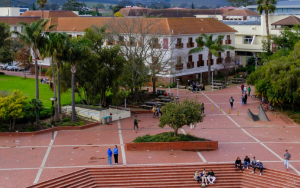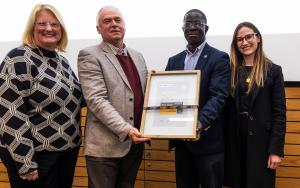
President Cyril Ramaphosa delivered the keynote address at Stellenbosch University’s 7th Social Justice Summit in Cape Town.
President Ramaphosa calls for united action to end hunger at flagship SU event
- President Cyril Ramaphosa delivers keynote address at Stellenbosch University’s 7th Social Justice Summit in Cape Town.
- Summit focuses on food security, climate change and peace as pathways to equality and resilience.
- President endorses the Musa Plan for Social Justice and urges collective action against hunger and inequality.
A light moment before a serious message
It takes a very big personality to upstage the president of South Africa – but that is precisely what happened at the start of Stellenbosch University’s (SU) seventh Social Justice Summit at the Cape Town International Convention Centre (CTICC) on Friday morning.
When Abenathi Ntshotsho, a Grade 7 learner and head boy of Ikaya Primary School in Kayamandi, took to the stage to read the Xhosa version of the Preamble to the Constitution, nerves got the better of him. In a moment that had the packed auditorium in stitches, he addressed the President affectionately by his nickname – “Hello Cupcake”. President Cyril Ramaphosa responded with warmth and humour, setting a gracious tone for a gathering that would go on to address some of South Africa’s most pressing issues: hunger, inequality and the right to food.
The Summit, hosted by SU’s Centre for Social Justice (CSJ) in partnership with the United Nations, Government and other collaborators, brought together an impressive assembly of leaders – from government, civil society, business, academia and international organisations – to explore the theme Social Justice, Food Security and Peace: Pathways to Equality, Solidarity, Sustainability and Climate Resilience.
Among the dignitaries in attendance were SU’s Rector and Vice-Chancellor, Prof Deresh Ramjugernath, Western Cape Premier Alan Winde, Dr Nicky Newton-King, Chair of the SU Council, leaders of international organisations, including the United Nations and numerous members of the public, civil society representatives and student leaders.
‘Hunger is not an accident of history’
In her welcoming remarks, Prof Thuli Madonsela, Director of the Centre for Social Justice and Chair in Social Justice in SU’s Faculty of Law, described the Summit as a moment of collective moral reckoning. She reminded the audience that hunger is not inevitable but “the result of human action and inaction.”
Calling for an integrated global law on food security and the right to food, Madonsela announced the Centre’s intention to establish a private commission to develop a Model Law on Food Security, Nutrition and the Right to Food, rooted in the principles of General Comment 12 on the right to food of the United Nations’ Committee on Economic, Social and Cultural Rights.
“Hunger is not just a moral issue, it is a legal and sustainability issue,” she said. “We are asking President Ramaphosa to champion this cause globally through the G20, BRICS, the African Union and the United Nations. We believe South Africa can lead the way.”
Madonsela also reflected on lessons from the sixth International Social Justice Conference, held on Wednesday and Thursday at the CTICC, which examined the nexus between hunger, conflict and climate resilience. “Peace and climate stability are both under threat,” she warned. “But peace is more than the absence of war – it is about human security, about justice and about ending impunity for the violation of rights.”
Opening address: A university in service of society
Welcoming delegates, Ramjugernath described the Summit as “an accountability moment” for both the University and the nation.
“For Stellenbosch University, social justice is not an abstract idea, it is central to our Vision 2040,” he said. “We measure success not by statements but by the tangible impact of our work – whether it is a meal reaching a hungry student, or a policy that improves the lives of ordinary South Africans.”
Ramjugernath emphasised that universities must be “engines of public value and public good”, translating research into policy and societal impact. He reaffirmed the University’s commitment to ending student hunger and supporting national pilot projects using SU’s campuses as “living laboratories” for innovation in food justice and climate resilience.
“Social justice is a team sport,” he said. “It requires government, business, civil society and universities to work together to break down silos and co-create solutions.”
Messages of partnership and accountability
In a message of support, Newton-King praised the Summit for spotlighting one of the country’s most urgent challenges. “Food insecurity goes to the very heart of social justice,” she said. “We cannot accept hunger in a nation so rich in resources and expertise. It is our collective duty – as government, business and universities – to find lasting solutions.”
Western Cape Premier Winde echoed this call for collaboration, urging a “partnership towards social justice”. Citing alarming data that 45% of South Africans do not have food security throughout the month, Winde warned that progress since the pandemic had reversed.
He outlined innovative provincial initiatives to combat hunger and child stunting, including a partnership between Shoprite Checkers, the DG Murray Trust and the Western Cape Department of Health, providing nutritional support to underweight mothers and infants. “Nothing stops a bullet like a job,” Winde said. “But nothing restores dignity like food on the table. We must get things done – together.”
President Ramaphosa: ‘The right to food is a test of our collective conscience’
Delivering the keynote address, Ramaphosa commended SU and the Centre for Social Justice for their leadership in advancing equality through the Musa Plan for Social Justice, describing it as “inspiring and necessary”.
He situated the Summit’s theme within South Africa’s broader National Development Plan (NDP) and the global Sustainable Development Goals (SDGs), noting that the countdown to 2030 “has begun in earnest.”
“Freedom from hunger is both a moral and developmental imperative,” the President said. “It is a constitutional right and a human right. The realisation of the right to food is not merely a measure of policy success. It is a test of our collective conscience.”
Ramaphosa reaffirmed government’s commitment to reducing poverty and malnutrition through the National School Nutrition Programme, which feeds 9,7 million learners daily, and through social grants that sustain millions of households. However, he called for greater accountability from the private sector, urging major food retailers to reconsider their profit margins and “join government in reducing the cost of living”.
“The great paradox of our time,” he said, “is that global food production is sufficient to feed everyone, yet millions still go hungry. This is a failure of justice, not of capacity.”
The President concluded by pledging to elevate the right to food within South Africa’s G20 Presidency, aligning national priorities with global efforts to combat hunger, strengthen climate resilience and uphold human dignity.
A moment of hope and unity
As the morning session closed, there was a palpable sense of purpose among the delegates — a recognition that social justice, as Madonsela has often said, “is not about just us, but about justice for all of us.”
For SU, the presence of the Head of State at its annual flagship social justice event marked not only a moment of immense pride, but also an affirmation of the University’s commitment to advancing equality, solidarity and sustainable development in South Africa and beyond.



